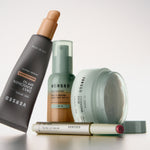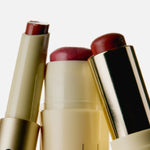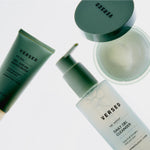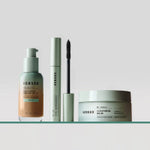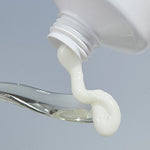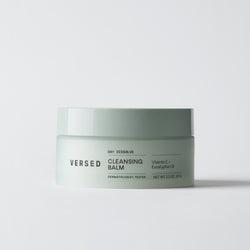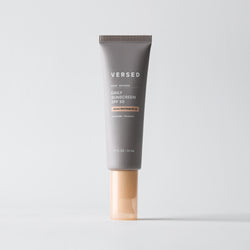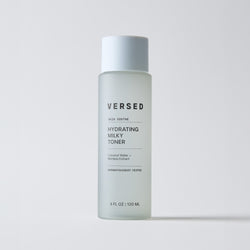If you have sensitive skin, you’re not building a skincare regimen just for the results. You’re also looking for formulas that won’t cause irritation, inflammation, itchiness, or any of the other uncomfortable symptoms this skin type often experiences. Avoiding scary-sounding skincare like "acids" and "retinoids" may sound sufficient until you realize that even the most basic cleanser can exhibit undecipherable ingredient lists filled to the brim with hidden irritants and fragrances.
Sound familiar? You"re not alone. Many members of Team Versed are part of the Sensitive Skin Club, which is just another reason creating gentle, skin-safe products everyone can use is so important to us. So don’t worry—we got you covered. We spoke to board-certified dermatologists Dr. Enrizza Factor and Dr. Anna Chacon, who enlightened us on what it truly means to have sensitive skin and which ingredients to look out for. Read their advice below.
WHAT IS SENSITIVE SKIN?
For every person with sensitive skin, there’s one who can slap just about anything on their face without a second thought. Statistically, this is pretty accurate: Around 60% of the population say they have sensitive skin.
So were the other 40% just genetically blessed? According to Dr. Factor, pretty much. She explains that sensitive skin, which is a skin type, is typically due to genetic differences in the skin’s barrier function and/or the immune system. The barrier may be weakened, allowing impurities and bacteria to flow in more easily than what’s typical. Then, “the immune system essentially overreacts to the exposed irritants or allergens,” causing inflammation, flushing, flakiness, stinging, burning, dryness, and even pimple-like bumps. Eczema, rosacea, and allergic contact dermatitis also fall under the sensitive skin category, adds Dr. Factor.
IS MY SKIN SENSITIVE OR SENSITIZED?
Although having sensitive skin is quite common, it’s often confused with sensitized skin, a short-term condition that can happen to anyone. Instead of genetics, sensitized skin is generated by harsh ingredients, bad habits (like over-exfoliating), stress, hormone fluctuations, and triggering environments, such as polluted cities and cold climates. Sensitized skin looks and feels like sensitive skin, but it can affect nearly anyone and, luckily, it's temporary.
THE BEST INGREDIENTS FOR SENSITIVE SKIN
Whether you have sensitized or sensitive skin, there are some changes you can make to your regimen to help control the symptoms. Keep your eyes peeled for words like "gentle", "pH-balanced", "soap-free", and "free from artificial fragrance.” You’ll also want to up the hydration to strengthen the skin’s moisture barrier, the key to fending off flare-ups. We recommend applying two drops of our Hyaluronic Hydrating Serum daily to do just that.
Witch hazel, seaweed, shea butter, green tea, and oatmeal (found in our Gentle Cycle Milky Cleanser) are some specific ingredients to look for in your products, says Dr. Factor.
Aloe vera is another healing option, Dr. Chacon adds. “Aloe vera is a naturally hydrating and soothing substance. A dab can help reduce inflammation and its antibacterial characteristics aid in the healing process.” No need to adopt an aloe vera plant anytime soon, however. A tube of our Dew Point Moisturizing Gel-Cream uses aloe leaf juice and antioxidant-rich green tea extract to deliver these benefits with a side of supple skin and ample dewiness. If moisturizer alone isn’t sufficient enough, especially during harsh winters, consider infusing skin with both aloe leaf juice and rosehip oil with the Look Alive Hydrating Plumping Mask beforehand.
All Versed products (with the exception of Doctor’s Visit Instant Resurfacing Mask) are developed with sensitive skin in mind and vetted by community members with all different skin types. If you want that extra verification, try these Sensitive Skin-Approved products below.
INGREDIENTS TO AVOID IF YOU HAVE SENSITIVE SKIN
Now that we know what to look for, are there any ingredients dermatologists recommend staying away from? Avoid “[denatured] alcohol, oxybenzone, parabens, formaldehyde, talc, phthalates, fragrances, and heavy metals,” Dr. Factor warns. Sensitive skin types may also want to skip intensive treatments such as facial peels and dermaplaning.Despite retinol and AHAs’ intimidating reputation, Dr. Factor says they’re a-okay. Instead of avoiding them, be smart about applying them. “Retinol is safe for sensitive skin. Start with a lower retinol dosage before gradually increasing it.” And instead of starting off strong, “apply retinol 2-3 times a week to build tolerance.” We recommend the Press Restart Gentle Retinol Serum for those prone to sensitization or dryness. It uses natural retinol alternatives and encapsulated retinol to deliver results without surface irritation.
As for exfoliation, reach for lactic acid. It’s the gentlest of the AHAs and leaves skin feeling soft and hydrated—not stripped. Dr. Factor also recommends azelaic acid; find both of these AHAs in our Weekend Glow Daily Brightening Toner.
One final note: If you’re uber-sensitive, exercise some extra caution when trying something new. Introduce new products one at a time and consider performing a patch test on a small area of skin (such as behind the ear) before applying anything to the face.
Shop products for sensitive skin below.
